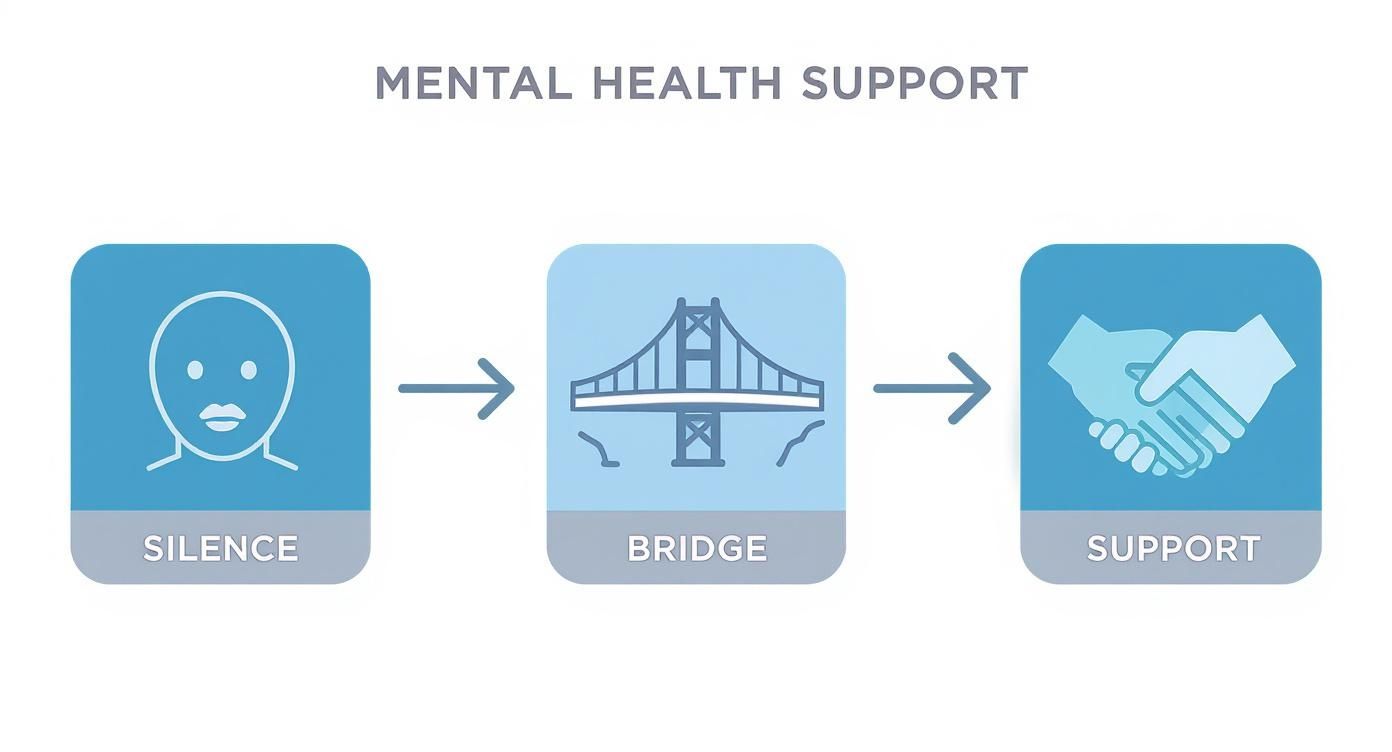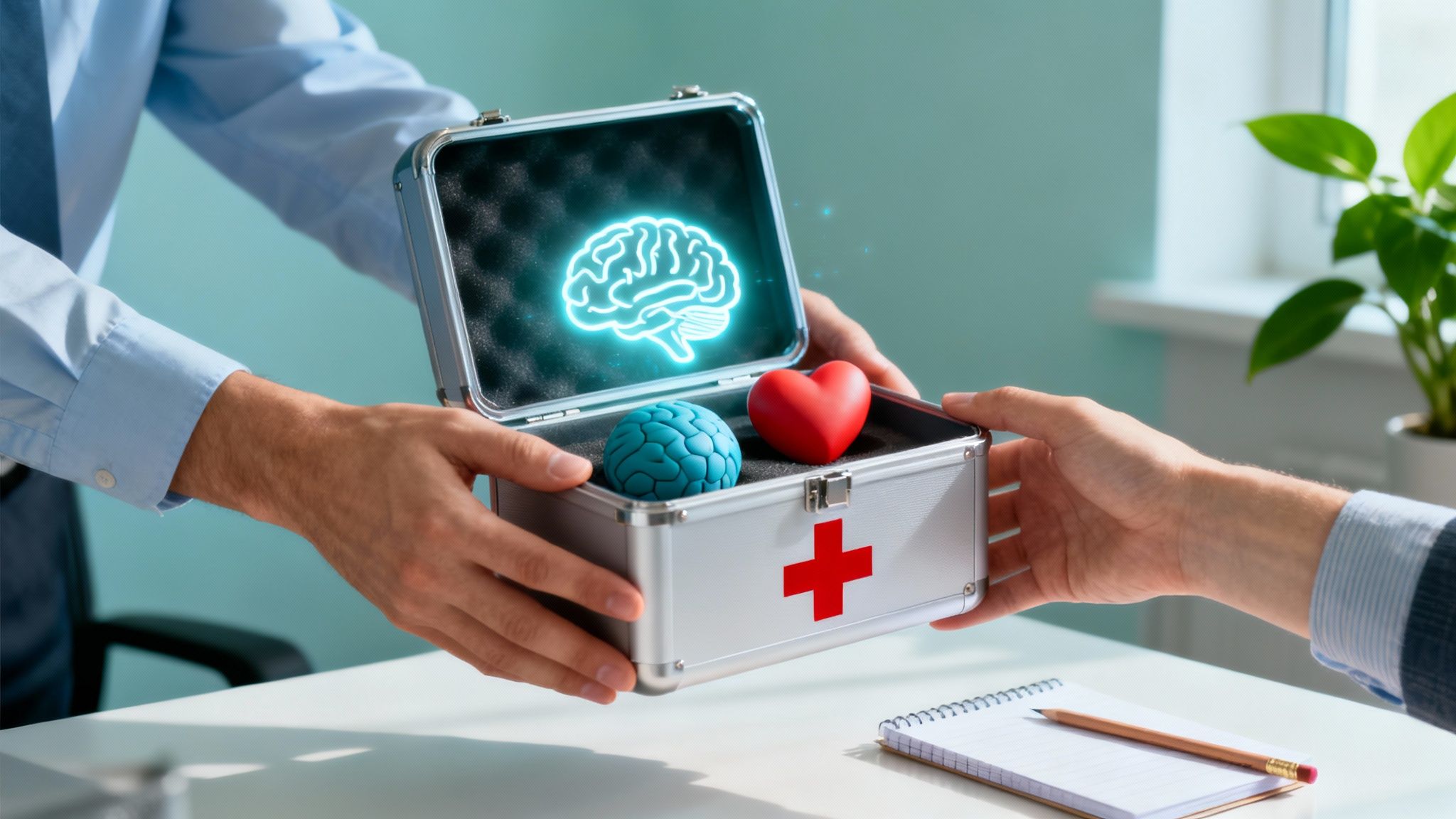Mental Health First Aid (MHFA) training gives you the skills to be a compassionate first responder when someone faces a mental health challenge. It’s not about becoming a therapist, but about knowing how to offer immediate, kind support until professional help is available.
Think of it as CPR for mental well-being—a practical skill that anyone can learn to support others with confidence and care.
What Exactly Is Mental Health First Aid Training?

If you saw someone with a physical injury, you would likely know a few basic steps to help them feel safe. Mental Health First Aid training gives you a similar, practical toolkit for emotional and psychological distress.
This training is for everyone, not just healthcare workers. Whether you're a manager in a bustling Indian city, a student, or a friend, you'll learn to notice early signs of mental health challenges and provide initial support without judgement.
Bridging the Gap to Professional Help
A common misunderstanding is that this training teaches you to provide therapy or counselling. The real goal is to bridge the gap between when someone starts struggling and when they receive professional care.
This role is vital, especially in a country like India where conversations around mental health are becoming more open. A trained first aider can make it feel safer for someone dealing with anxiety or depression to take that brave first step toward professional help.
Building Skills for Real-Life Situations
The training is practical and hands-on, designed to give you real-world skills for navigating sensitive conversations. It focuses on building both your ability to help and your own emotional resilience and compassion.
Here's a look at the abilities you'll develop in a Mental Health First Aid course.
| Skill Area | What You Will Learn |
|---|---|
| Recognising Early Signs | How to notice subtle changes in behaviour that may signal challenges like burnout or workplace stress. |
| Providing Initial Support | The fundamentals of active listening and offering genuine reassurance in a supportive, non-judgemental way. |
| Guiding to Professional Help | How to gently encourage someone to connect with resources like therapy or counselling services. |
| Crisis Intervention Basics | Essential skills to assist someone in a mental health crisis until professional support arrives. |
This training provides a clear framework for responding effectively and safely.
The core principle is that your role as a first aider is to observe and support, never to diagnose. The goal is not to label someone, but to create a safe space where they feel comfortable opening up and seeking help.
Ultimately, MHFA training strengthens your own emotional literacy. It gives you the confidence to be there for your community, helping to build a culture where well-being truly matters.
Why Mental Health First Aid is So Crucial in India Right Now
In India, there's often a gap between the number of people struggling with their mental health and the professional help available. For a long time, it has been difficult to talk about challenges like anxiety and depression. This silence can prevent people from considering therapy or counselling, leaving them feeling isolated.
This is where mental health first aid training makes a difference. It creates allies—friends, family, and colleagues who have the skills and compassion to offer that first crucial bit of support. A trained first aider can be the bridge that helps someone move from silent struggle toward getting help.
By teaching practical listening skills and a clear action plan, this training helps build communities of care. It makes it easier to have open conversations about mental health, one person at a time.
Closing the Preparedness Gap
This training is vital because many people feel unprepared to help someone in a mental health crisis. When Mental Health First Aid guidelines were first developed for India, a key focus was on suicide prevention. Research showed a stark contrast: while professionals felt confident helping, the general public felt 'not at all' or only 'somewhat prepared.' You can explore the full research on these findings to see this gap.
This isn't just a statistic; it's a call to action. Mental Health First Aid training directly addresses this need, giving people the confidence to step in safely and effectively.
Building More Resilient Workplaces
The modern workplace can be a source of significant pressure, where workplace stress and burnout affect both employee well-being and company performance. When employees don't feel supported, morale and productivity can suffer.
A manager or colleague with mental health first aid skills can spot early signs that someone is struggling. By offering a non-judgemental ear and guiding them toward professional help, they create a psychologically safer work environment where people feel seen and valued.
Remember, a mental health first aider's role is supportive, not diagnostic. The assessment of a situation is for informational purposes only. The goal is to start a caring conversation and help someone find professional help, never to label their experience.
Moving from Stigma to Supportive Action
That first conversation can be a turning point for someone on their path to recovery. This training shifts our culture from silence to support in several key ways:
- Building Compassion: It teaches you to listen without judgement, replacing misunderstanding with empathy and genuine care.
- Encouraging Early Help-Seeking: People are more likely to seek help for anxiety or depression when they have trained allies who understand.
- Promoting Positive Psychology: The training also fosters positive concepts like resilience, happiness, and greater well-being in yourself and others.
Ultimately, the aim is to weave a strong safety net of support through our communities. The supportive takeaways from this training offer something very practical: the ability to care in a meaningful way.
Your Practical Toolkit for Providing Support
At its core, mental health first aid training equips you with practical, real-world skills. It moves you beyond good intentions, providing a structured way to respond when you see someone struggling.
The training gives you tools to break the silence that often surrounds challenges like anxiety or depression. You learn how to start a supportive conversation, listen with empathy, and create a safe space for someone to open up without fear.

This visual captures the journey from isolation to connection, showing how a trained first aider can guide someone toward the help they need.
Introducing the ALGEE Action Plan
To give you a reliable framework, most mental health first aid training courses are built around a simple yet powerful action plan. One of the most widely used models is the ALGEE action plan.
Each letter represents a clear step, giving you a logical sequence to follow. This structure helps reduce anxiety about what to do next, allowing you to focus on the person in front of you.
The plan involves these steps:
- Assess for risk of suicide or self-harm.
- Listen non-judgementally.
- Give reassurance and information.
- Encourage appropriate professional help.
- Encourage self-help and other support strategies.
This is a flexible guide that you can adapt to any situation, helping you stay grounded and cover the most important steps.
Listening Without Judgement
One of the most valuable skills you’ll gain is the art of listening without judgement. This means setting aside your own assumptions and simply being present for the other person. You learn to hear what they are truly saying, creating a powerful sense of connection and trust.
Effective communication is key to providing support. To dive deeper into these abilities, you might find value in resources on effective communication skills training. These skills are essential for showing genuine empathy and ensuring the person feels truly heard.
It’s important to remember that any assessments you learn are for informational purposes, never for diagnosis. Your role is to understand the immediate situation and ensure safety, not to apply a clinical label to someone's experience.
This approach empowers the person who is struggling by validating their feelings. It sends a clear message that their experience is real and that they are not alone.
Guiding Toward Professional Support
A key part of your role as a mental health first aider is acting as a bridge to professional care. The training teaches you how to discuss therapy and counselling in a supportive, non-intimidating way.
For instance, you might learn gentle ways to suggest professional support, like, "It sounds like you're going through a lot right now. Have you considered talking to someone trained to help with these feelings?" This approach respects their autonomy while opening a door to new possibilities.
The toolkit you gain is built on both skill and compassion. It prepares you to handle difficult conversations with grace and helps deepen your own emotional intelligence and resilience.
Learning to See the Early Signs of Distress

One of the most valuable skills from mental health first aid training is learning to see what often goes unnoticed. It’s not about mind-reading, but about developing a gentle awareness of the people around you. You learn to recognise subtle shifts that might signal someone is struggling before they find the words to say so.
This is a skill of observation, not assumption. The training helps you notice real-world changes, like a colleague becoming withdrawn due to workplace stress, or a friend who seems constantly on edge, a common sign of anxiety.
Looking Beyond the Obvious
Distress doesn’t always appear as sadness or frustration. Often, it's quieter, showing up in small changes to a person's daily patterns. Your training will help you see these subtle cues as a call for support.
Think about these less obvious signs:
- Changes in Social Habits: A friend who loves social events suddenly starts avoiding them.
- Shifts in Communication: Someone who was once responsive now seems distant or takes days to reply.
- Neglecting Personal Care: A noticeable change in personal grooming or appearance that is out of character.
- Increased Irritability: Small frustrations now trigger an unexpectedly sharp reaction.
Noticing these shifts is the first step. The goal is not to jump to conclusions, but to know when it might be time to gently check in.
Understanding Workplace Stress and Burnout
The modern Indian workplace can be a high-pressure environment where chronic workplace stress can lead to burnout. A key part of mental health first aid training is learning to identify these signs in a professional setting.
You might notice a team member missing deadlines or seeming disengaged in meetings. These are often signs that someone is overwhelmed, not that they lack a good work ethic. As a trained first aider, you learn to see these behaviours through a lens of compassion.
It’s vital to remember that these observations are informational, not diagnostic. Your role is never to diagnose someone with depression or an anxiety disorder. It is simply to notice a change and care enough to ask if they are okay.
This distinction is empowering. It frees you from the pressure of having all the answers and lets you focus on providing a safe, non-judgemental space for someone to feel heard.
From Challenges to Positive Psychology
While the training focuses on identifying difficulties, it also includes principles of positive psychology. You will learn to recognise the foundations of well-being, such as resilience, compassion, and connection. Understanding what helps people thrive makes it easier to spot when those foundations are weakening.
This balanced view helps you frame your support more constructively. Rather than only focusing on the problem, you can also help someone reconnect with their own strengths and inner resilience.
This training sharpens your emotional intelligence. By learning to see early signs of challenges like anxiety or depression, you are better prepared to offer timely support until they can connect with professional therapy or counselling.
What You Really Gain from the Training
Becoming a Mental Health First Aider creates a positive ripple effect in your life. You gain the confidence to approach tough conversations with empathy, cutting through the fear that often stops us from discussing mental health.
This training also boosts your own well-being. As you learn to spot signs of distress and support others, you build your own emotional toolkit, becoming more self-aware and resilient.
Creating a Better Place to Work
In your professional life, these skills make you a valuable asset. You become someone who actively builds a workplace culture where people feel safe and supported, which is crucial with rising workplace stress and burnout.
For managers, this training is a game-changer. It provides practical skills to look after your team's well-being, handle issues like anxiety before they grow, and foster a more human and engaged work environment.
One supportive conversation can truly change a life. The training empowers you to start that conversation, knowing your role is to offer initial help and guide someone toward professional therapy or counselling, not to provide a cure.
A single trained person can start to shift a company's culture from silence to open support, making it normal to talk about mental health.
Building Stronger Communities and Breaking Down Stigma
The ripple effect extends beyond the workplace. Every person trained as a Mental Health First Aider helps break down the stigma surrounding challenges like depression. This is a crucial step toward creating more connected and understanding communities across India.
When you're trained, you encourage people to get help sooner. By responding with empathy, you create a safe space for friends and family to share what they're going through. This act can be the bridge that connects someone to the professional support they need.
The benefits build on each other:
- For You: You'll feel more confident, emotionally intelligent, and better equipped to handle life's challenges.
- For Your Workplace: It helps create a supportive atmosphere, reduces workplace stress, and boosts team well-being.
- For Your Community: It chips away at stigma, encourages early help-seeking, and weaves a stronger, more compassionate social fabric.
At its heart, mental health first aid training is an investment in human connection. It nurtures compassion and understanding, helping to build a world where we all feel a little more seen and supported.
How to Find and Enrol in an MHFA Course
Deciding to get trained in Mental Health First Aid is a wonderful step. A quick online search for certified providers in your city is a great place to start, as many organisations across India now offer accredited mental health first aid training.
As you look at different providers, consider what kind of learning environment suits you. Do you prefer an interactive classroom setting, or does the flexibility of an online course better fit your life?
Choosing the Right Training Format
The choice between online or in-person courses depends on your learning style. Each format offers unique benefits for learning how to support someone experiencing anxiety or depression.
- In-Person Workshops: These are highly interactive and often use role-playing to build real-world confidence. The direct contact with instructors and peers creates a strong sense of community.
- Online Courses: For those with busy schedules, online training offers incredible flexibility. You can learn at your own pace from anywhere with an internet connection.
- Blended Learning: This hybrid approach combines the convenience of online modules with live, instructor-led sessions to practice your skills.
What to Look for in a Provider
It’s important to choose an accredited provider to ensure the course material is evidence-based and your certification is respected. Also, review the instructors' qualifications and the course outline to make sure it aligns with your goals for improving community well-being.
Remember, the aim of any assessment within these courses is purely informational—to build your awareness. It is never about making a clinical diagnosis; your role is to offer initial support and guide someone toward professional counselling or therapy.
The availability of formal first aid training that includes mental health is still growing in India. A study found that training for first responders was often infrequent, showing a need to expand these vital programs. You can read more on the state of first aid training in India to see why it matters.
By enrolling, you’re joining a growing movement of compassion and helping to build a more supportive community, one conversation at a time.
Common Questions About MHFA Training
Stepping into mental health first aid training is a big step, and it's natural to have questions. Let's clear up some common queries to help you feel confident about getting started.
People often wonder, "Am I qualified enough to do this?" The answer is yes. This training is designed for everyone, not just clinicians, giving everyday people the tools to offer compassionate support.
Will This Training Let Me Diagnose or Provide Therapy?
No, and this is a crucial point. MHFA training does not teach you to diagnose conditions like anxiety or depression, nor does it turn you into a therapist or counsellor. The goal is to help you spot signs of distress, offer immediate support, and guide someone toward professional help.
Think of it like physical first aid. You learn to apply a bandage to prevent things from getting worse, but you wouldn't perform surgery. Your role is to be a bridge to proper care.
Is This Training Only for Healthcare Professionals?
Not at all. Mental Health First Aid is for teachers, managers, parents, and community leaders. The skills you learn are for everyday situations, helping to create communities where more people feel equipped to look out for one another.
It's worth repeating: any assessments you learn are purely for understanding the situation to provide safe, initial help. They are not diagnostic tools and are never about putting a label on what someone is going through.
How Long Does a Typical Course Take?
The time commitment can vary. A face-to-face course often takes place over two full days. Blended or online options might spread the learning over a few weeks with self-study modules and live sessions.
It's always best to check with accredited providers to see their schedules. This will help you find a format that fits into your life.
What if I Say the Wrong Thing When Trying to Help?
This is a common fear, and the training addresses it directly. You'll learn simple frameworks for conversations and practice active listening skills to build your confidence. A key takeaway is that showing you care and listening without judgement is more important than finding the "perfect" words.
The training helps you build your own resilience and shifts your mindset from a fear of making mistakes to a focus on compassion. It empowers you to be a genuine, supportive presence in someone's life.
Feeling inspired to find the right support for yourself or someone you know? At DeTalks, we connect you with qualified therapists and provide science-backed assessments to guide your journey toward greater well-being. Explore professional help at DeTalks.





